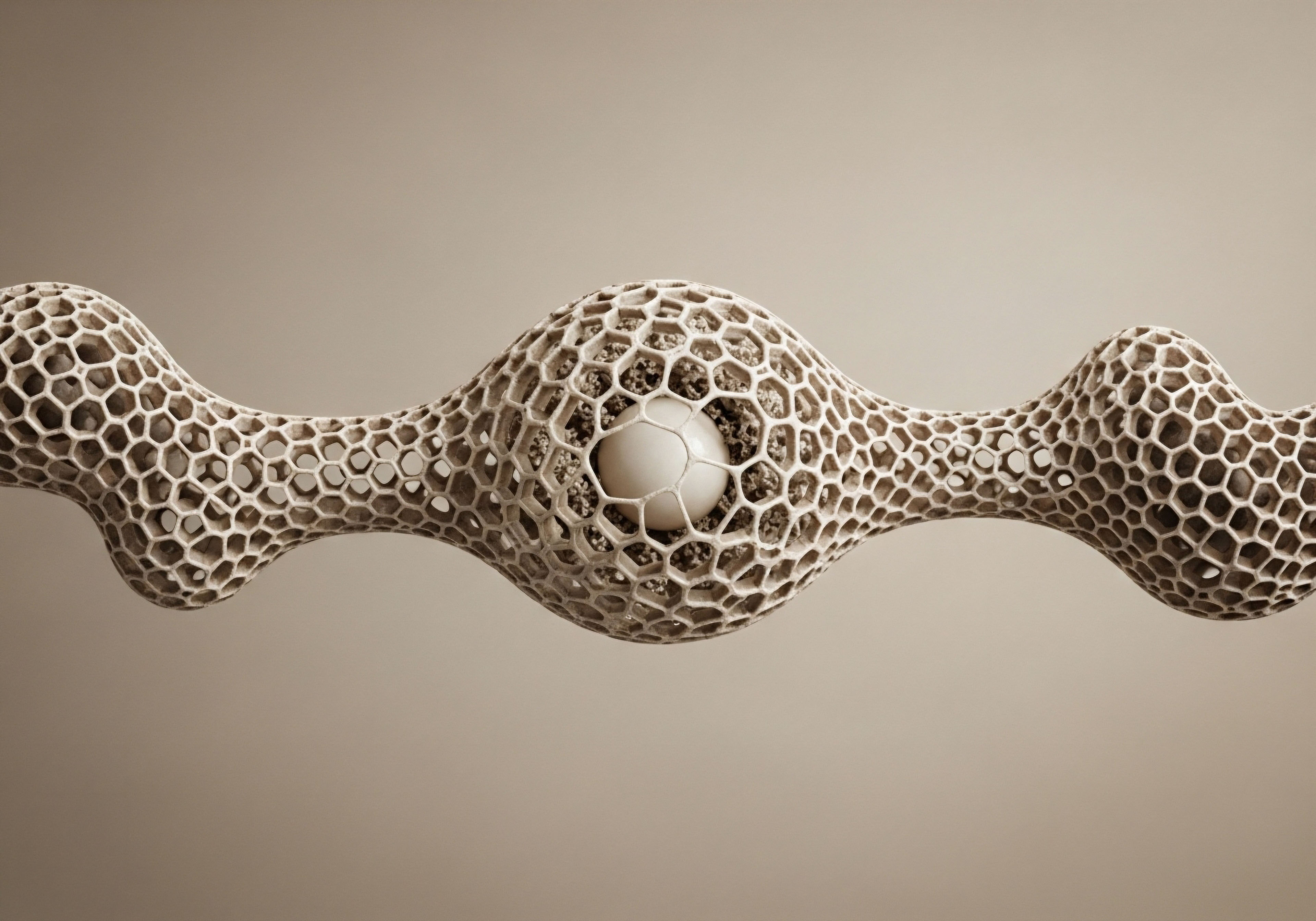

Fundamentals
You may have noticed a subtle shift in your mental clarity, a feeling that your cognitive sharpness has been replaced by a persistent mental fog. This experience, a deeply personal and often frustrating one, is a valid and important signal from your body.
It is a direct reflection of the intricate communication network within your biology, a system where hormones act as the primary messengers. When we talk about cognitive support, we are speaking the language of cellular health, understanding that the brain’s ability to function optimally is profoundly connected to the body’s overall hormonal and metabolic state.
The conversation about hormonal therapies and lifestyle is about restoring the integrity of this internal communication system, ensuring your brain receives the clear, consistent signals it needs to perform.
Thinking about hormones requires us to appreciate their role as powerful signaling molecules that regulate nearly every bodily function, from our energy levels and mood to our ability to think and remember. During significant life transitions, such as perimenopause in women or andropause in men, the production of key hormones like estrogen and testosterone declines.
This is a natural process, yet its effects can be far-reaching. Estrogen, for instance, is a key player in maintaining neuronal health, supporting the growth of new connections between brain cells, and regulating neurotransmitters that influence mood and cognition. Similarly, testosterone has a direct impact on cerebral blood flow and the structural integrity of brain tissues.
When the levels of these hormones fluctuate or decrease, the brain’s operational capacity can be affected, leading to the very symptoms of cognitive fog, memory lapses, and difficulty concentrating that you may be experiencing.
The brain’s cognitive function is directly linked to the body’s hormonal and metabolic balance, with hormones acting as essential messengers for cellular communication.
This is where the concept of a collaborative approach to wellness becomes so vital. Hormonal therapies, when clinically indicated and properly administered, can replenish the declining levels of these crucial messengers, providing a foundational level of support for your neurological systems. This biochemical recalibration can help to stabilize the environment in which your brain cells operate.
Simultaneously, targeted lifestyle interventions ∞ such as specific nutritional strategies, consistent physical activity, and stress modulation techniques ∞ work on a parallel track. These interventions enhance cellular resilience, reduce inflammation, and improve metabolic efficiency, creating a biological backdrop that allows hormonal therapies to be more effective. The synergy between these two modalities is where true, sustainable cognitive support is found.
The goal is to create a state of physiological resilience, where your body and brain are better equipped to handle the stressors of daily life and the natural processes of aging. By addressing both the hormonal signals and the cellular environment, we can move towards a state of optimized function.
This integrated perspective empowers you to take a proactive role in your health, understanding that your daily choices have a direct and meaningful impact on your cognitive vitality. It is a journey of reconnecting with your body’s innate intelligence and providing it with the precise support it needs to function at its best.


Intermediate
To appreciate how lifestyle interventions can complement hormonal therapies for cognitive support, we must first understand the specific mechanisms at play. Hormonal optimization protocols are designed to restore physiological balance, while lifestyle factors fine-tune the cellular environment, enhancing the efficacy of these treatments. This section will detail the clinical rationale behind combining these approaches, focusing on how they synergistically support neuroprotection and cognitive function.

The Role of Hormonal Therapies in Neuroprotection
Hormonal therapies, particularly those involving estrogen and testosterone, exert direct effects on the brain. Estrogen, for example, has been shown to modulate the synthesis and activity of key neurotransmitters like acetylcholine, serotonin, and dopamine, all of which are integral to memory, mood, and executive function.
It also promotes synaptic plasticity, the ability of neurons to form new connections, which is the cellular basis of learning and memory. In women experiencing perimenopause or post-menopause, the decline in estrogen can lead to a reduction in these neuroprotective effects, contributing to cognitive symptoms.
For men, testosterone plays a similar role. It has been demonstrated to have neurotrophic effects, supporting the survival and growth of neurons. Low testosterone levels, a condition known as hypogonadism, are often associated with symptoms of cognitive decline, including memory problems and reduced mental sharpness.
Testosterone replacement therapy (TRT) in men with clinically diagnosed low levels can help restore these neuroprotective functions. A standard protocol for men might involve weekly intramuscular injections of Testosterone Cypionate, often combined with medications like Anastrozole to manage estrogen conversion and Gonadorelin to maintain testicular function.
Lifestyle interventions, such as nutrition and exercise, create an optimal cellular environment that enhances the neuroprotective effects of hormonal therapies.

How Do Lifestyle Interventions Enhance Hormonal Efficacy?
Lifestyle interventions work in concert with hormonal therapies by addressing the broader aspects of metabolic and cellular health. A diet rich in anti-inflammatory foods, for example, can reduce systemic inflammation, which is a known contributor to neurodegenerative processes. Chronic inflammation can impair the blood-brain barrier, allowing harmful substances to enter the brain and disrupt neuronal function. By mitigating inflammation, a well-formulated nutritional plan can create a more favorable environment for hormonal therapies to exert their neuroprotective effects.
Physical exercise is another powerful modulator of cognitive health. It increases cerebral blood flow, delivering more oxygen and nutrients to the brain. Exercise also stimulates the production of brain-derived neurotrophic factor (BDNF), a protein that supports the growth and survival of neurons. When combined with hormonal therapies, the effects can be additive. For instance, testosterone can enhance muscle mass and physical capacity, making it easier to engage in regular exercise, which in turn boosts BDNF and cognitive function.
The following table outlines how specific lifestyle interventions can synergize with hormonal therapies:
| Lifestyle Intervention | Mechanism of Action | Synergy with Hormonal Therapy |
|---|---|---|
| Anti-Inflammatory Nutrition | Reduces systemic and neuro-inflammation | Creates a less hostile environment for hormonal action, improving neuroprotection |
| Regular Physical Exercise | Increases cerebral blood flow and BDNF production | Enhances the neurotrophic effects of hormones like testosterone and estrogen |
| Stress Management (e.g. meditation) | Lowers cortisol levels, reducing its neurotoxic effects | Prevents high cortisol from interfering with the beneficial effects of hormonal therapies |
| Optimized Sleep | Facilitates synaptic pruning and waste clearance from the brain | Allows for optimal hormonal regulation and cellular repair, maximizing the benefits of therapy |

Peptide Therapies as a Complementary Approach
In addition to traditional hormonal therapies, certain peptide therapies can offer another layer of support for cognitive health. Peptides are short chains of amino acids that act as signaling molecules in the body. Some peptides, such as those that stimulate growth hormone release like Sermorelin or CJC-1295/Ipamorelin, can have indirect cognitive benefits by improving sleep quality and metabolic function.
Others, like Humanin, have demonstrated direct neuroprotective effects in preclinical studies, suggesting a potential role in mitigating age-related cognitive decline. These peptides can be integrated into a comprehensive wellness plan to further enhance the synergistic effects of hormonal therapies and lifestyle interventions.
- Sermorelin/Ipamorelin ∞ These growth hormone-releasing peptides can improve sleep quality, which is essential for cognitive function and hormonal regulation.
- Humanin ∞ This mitochondrial-derived peptide has shown promise in protecting cells from age-related damage and may have neuroprotective properties.
- BPC-157 ∞ While primarily known for its tissue-repair capabilities, BPC-157 may also have systemic benefits that support overall health, indirectly contributing to a better cognitive environment.


Academic
The interplay between hormonal signaling, metabolic function, and neuronal health is a complex and deeply interconnected system. From an academic perspective, understanding how lifestyle interventions can augment hormonal therapies for cognitive support requires a detailed examination of the underlying molecular and cellular mechanisms. This section will explore the scientific literature on this topic, focusing on the systems-biology perspective and the evidence from clinical and preclinical studies.

The Neuroendocrine-Metabolic Axis and Cognitive Function
The brain does not operate in isolation. It is in constant communication with the rest of the body through a complex network of hormonal and metabolic signals. The Hypothalamic-Pituitary-Gonadal (HPG) axis, which regulates the production of sex hormones like estrogen and testosterone, is a key component of this network.
Disruptions in the HPG axis, such as those that occur during menopause or andropause, can have cascading effects on brain function. Estrogen receptors are widely distributed throughout the brain, particularly in regions critical for memory and cognition, such as the hippocampus and prefrontal cortex. The decline in estrogen during menopause can lead to a reduction in synaptic density and altered neurotransmitter function in these areas.
Metabolic factors also play a critical role. Insulin resistance, a condition where cells become less responsive to the effects of insulin, is a common feature of aging and is strongly linked to cognitive decline. The brain is a highly metabolic organ, and impaired glucose metabolism can lead to energy deficits and increased oxidative stress, both of which are detrimental to neuronal health.
Hormonal therapies can help to improve insulin sensitivity, but their effects can be significantly enhanced by lifestyle interventions such as a low-glycemic diet and regular exercise.
The synergistic effect of hormonal therapies and lifestyle interventions on cognitive function is rooted in their combined ability to modulate the neuroendocrine-metabolic axis and enhance cellular resilience.

What Are the Limitations of Current Research?
While the theoretical basis for combining hormonal therapies and lifestyle interventions is strong, the clinical evidence is still evolving. Many studies on hormone replacement therapy (HRT) have produced mixed results, which may be due to a variety of factors, including the type of hormone used, the timing of initiation, and the duration of treatment.
The Women’s Health Initiative Memory Study (WHIMS), for example, found that combined estrogen and progestin therapy in older postmenopausal women was associated with an increased risk of dementia. However, subsequent analyses have suggested that the timing of HRT initiation is critical, with earlier initiation closer to the onset of menopause potentially being more beneficial.
A significant limitation of much of the existing research is the lack of detailed information on lifestyle factors. Many studies do not comprehensively assess diet, exercise, or other lifestyle variables, making it difficult to determine how these factors might interact with hormonal therapies. Future research needs to adopt a more holistic approach, examining the combined effects of hormonal and lifestyle interventions in well-designed clinical trials. The following table highlights some of the key research gaps and future directions:
| Research Area | Current Limitations | Future Research Directions |
|---|---|---|
| Hormone Replacement Therapy Trials | Mixed results, often lacking detail on lifestyle factors and timing of initiation. | Long-term studies with comprehensive assessment of lifestyle variables and standardized protocols. |
| Peptide Therapies for Cognition | Mostly preclinical data, with limited human trials. | Well-controlled clinical trials to evaluate the safety and efficacy of peptides like Humanin for cognitive support. |
| Systems-Biology Approaches | Lack of integrated models that combine hormonal, metabolic, and lifestyle data. | Development of computational models to predict individual responses to combined interventions. |

The Future of Personalized Cognitive Wellness
The ultimate goal is to move towards a more personalized approach to cognitive wellness, where interventions are tailored to an individual’s unique biology and lifestyle. This will require a deeper understanding of the complex interplay between genes, hormones, metabolism, and environment.
Advanced diagnostic tools, such as genetic testing and comprehensive hormonal and metabolic profiling, can help to identify individuals who are most likely to benefit from specific interventions. By combining this personalized data with a systems-biology perspective, we can develop more effective strategies for preserving cognitive function and promoting healthy aging.
The integration of hormonal therapies with targeted lifestyle interventions represents a powerful paradigm for supporting cognitive health. While more research is needed to fully elucidate the optimal protocols, the existing evidence provides a strong rationale for this synergistic approach. By addressing both the underlying hormonal imbalances and the broader aspects of cellular and metabolic health, we can create a more resilient and adaptable neuroendocrine system, capable of withstanding the challenges of aging and maintaining cognitive vitality throughout the lifespan.
- Personalized Protocols ∞ Future interventions will likely be tailored to an individual’s genetic and metabolic profile, moving beyond one-size-fits-all approaches.
- Advanced Diagnostics ∞ Comprehensive testing will allow for a more precise understanding of an individual’s hormonal and metabolic status, guiding the selection of appropriate therapies.
- Integrated Care Models ∞ A collaborative approach involving endocrinologists, neurologists, and lifestyle medicine specialists will be essential for delivering comprehensive cognitive wellness care.

References
- Gleason, C. E. Dowling, N. M. Wharton, W. et al. (2015). Effects of Hormone Therapy on Cognition and Mood in Recently Postmenopausal Women ∞ Findings from the Randomized, Controlled Kronos Early Estrogen Prevention Study (KEEPS). PLoS Medicine, 12(6), e1001833.
- Hogervorst, E. Yaffe, K. Richards, M. & Huppert, F. (2002). Hormone replacement therapy for cognitive function in postmenopausal women. Cochrane Database of Systematic Reviews, (2).
- Saleh, R. N. et al. (2025). Hormone replacement therapy, menopausal age and lifestyle variables are associated with better cognitive performance at follow-up but not cognition over time in older-adult women irrespective of APOE4 carrier status and co-morbidities. Frontiers in Dementia, 3, 1496051.
- Shumaker, S. A. Legault, C. Rapp, S. R. et al. (2003). Estrogen plus progestin and the incidence of dementia and mild cognitive impairment in postmenopausal women ∞ the Women’s Health Initiative Memory Study ∞ a randomized controlled trial. JAMA, 289(20), 2651-2662.
- Yen, K. Lee, C. & Mehta, H. H. (2018). The emerging role of mitochondrial-derived peptides in aging, neurodegeneration, and other age-related diseases. Cell Metabolism, 27(4), 735-746.

Reflection
The information presented here is a starting point, a map to help you understand the terrain of your own biology. The true journey begins with introspection, with connecting these scientific concepts to your own lived experience. How do you feel? What are your goals for your cognitive health?
Answering these questions honestly is the first step towards developing a personalized path to wellness. The knowledge you have gained is a powerful tool, but its true value lies in its application. Consider this the beginning of a conversation with your body, one that is guided by both scientific understanding and self-awareness. Your path to cognitive vitality is unique to you, and it is a path that you have the power to shape.

Glossary

cognitive support

hormonal therapies

perimenopause

testosterone

cerebral blood flow

estrogen

lifestyle interventions

cognitive function

neuroprotection

neuroprotective effects

brain-derived neurotrophic factor

increases cerebral blood flow

peptide therapies

cognitive health

humanin

andropause

insulin resistance

lifestyle interventions such

hormone replacement therapy

health initiative memory study

postmenopausal women




